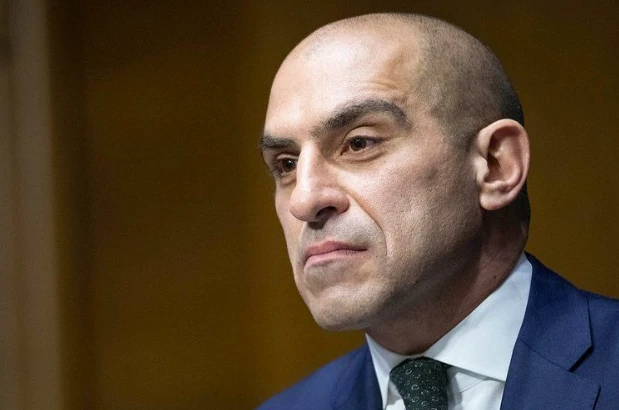For two consecutive days, the U.S. Securities and Exchange Commission (SEC) successively filed lawsuits against two leading exchanges such as Binance and Coinbase, which shocked Crypto and the entire financial industry.
While the SEC and its head Gary Gensler are frantically exporting, Rostin Behnam, chairman of the Commodity Futures Trading Commission (CFTC), another major U.S. regulator, will also attend the House of Representatives Agriculture Committee today on Providing Clarity for the Digital Asset Spot Market thematic hearings. Earlier, Rostin had published the full text of todays testimony on his personal social media, from which we may have a glimpse of the agencys current attitude towards Crypto.
Below is the full text of Rostins testimony, compiled by Odaily.

secondary title
On the need for legislative action
Since appearing before the Senate hearings two years ago, I have been emphasizing the need for legislative action to address the lack of regulation in the digital goods marketplace. As I have made clear in my congressional testimony and other public statements, bringing this volatile market into regulation protects customers, ensures market resilience and stability, and prevents risks from spilling over into the traditional financial system.
Im not alone in thinking this way. Last year, the Financial Stability Oversight Board unanimously released a report on “Financial Stability Risks in Digital Asset Markets.” A core recommendation in the report is to call on Congress to enact laws to fill the apparent regulatory gap in the spot market for non-securities digital assets.
Events of the past year have added urgency to these recommendations. The bankruptcy of several large digital asset platforms wiped out billions of dollars in customer funds; several large market participants were suspected of engaging in black-box manipulation with affiliated trading platforms; cybersecurity vulnerabilities were also continuously exploited by hackers, resulting in billions of dollars in losses. loss of funds...
Leaving billions of dollars of client funds and investments in largely unregulated entities is bound to lead to a kind of disaster. However, recent history has provided us with much actionable lessons. Following the 2008 financial crisis, the Commissions bipartisan reforms to the previously unregulated swaps market were based on sound market regulation. Based on the core principles, measures such as transparency requirements, reporting and registration requirements have been designed.
These measures are necessary to prevent potential future crises, and they are now well-established regulations in the derivatives market. In fact, during the bankruptcy of FTX Group, there was a related entity regulated by CFTX that avoided a similar ending (it should refer to Ledgerx, a derivatives exchange that once belonged to FTX), and this is precisely because CFTC regulation requires that any registered entity must Ensure client funds are segregated, financial resources are adequate, and governance is appropriate. That is, the entity is operationally able to protect client funds and continue to operate.
secondary title
The focus of supervision
I encourage Congress and the executive branch to continue to pay attention to the regulatory gaps in digital commodities, and I fully support the Commissions enactment of legislative measures to grant more powers to the CFTC. However, any new laws considered by Congress cannot undermine existing laws. If securities laws apply, the Securities and Exchange Commission (SEC) should use its powerful powers to protect customers and address information gaps in the marketplace between issuers of securities and investors.
I would like to emphasize that in any legislation on this issue, Congress should focus on the following:
1. Stronger customer protection
In a novel and technologically complex market for digital assets, strong customer protection is critical. Congress should ensure that the CFTC has full authority to require registered entities to make necessary disclosures regarding a variety of matters (such as investment risks, cybersecurity risks, mining, settlement practices, and other related activities) to ensure customers receive the best price and require registration The entity does a good job of isolating and protecting customer funds to prevent platform failures.
We also know that these marketplaces are often advertised as a form of “financial inclusion,” yet their users are the most vulnerable to the inherent risks and predatory financial schemes of these assets. Any legislation in this area should recognize this dynamic and further work and research is needed to better understand how these populations interact with this market and to ensure they are adequately protected.
2. More comprehensive regulatory powers
In the absence of federal market regulation, the digital asset market has been plagued by fraud and manipulation. The CFTC has been proactive in regulating these markets, bringing 85 cases totaling more than $4 billion in fines and restitution.
However, our legal powers in spot markets for digital commodity tokens are limited to the extent that we can only take action after fraud has occurred. A better regulatory regime should give the CFTC the power to proactively create rules to minimize fraud. This should include setting strict standards for preventing conflicts of interest, establishing rules to maintain fair, open and transparent markets, and actively monitoring the trading activities of market participants.
3. New mandates require more funding
Currently, the CFTC is the only financial markets regulator that relies on appropriations from Congress. Other financial regulators have self-funding mechanisms, which provide greater assurance that their fiscal year budget submissions will be fully funded. For a regulatory agency to assume a new mandate, Congress must provide the agency with the resources it needs to assume the new mandate. Regulation of digital commodity markets will place new responsibilities on the CFTC that cannot be fulfilled solely with our existing resources.
I want to thank the committee again for giving me the opportunity to testify today. I am pleased that the Commission is able to address difficult policy issues in the digital asset space, particularly addressing existing regulatory loopholes. Of course, there is much more work to be done, and I stand ready to discuss this legislative proposal with this committee and members of Congress to ensure it addresses all of the key considerations for this emerging market.










